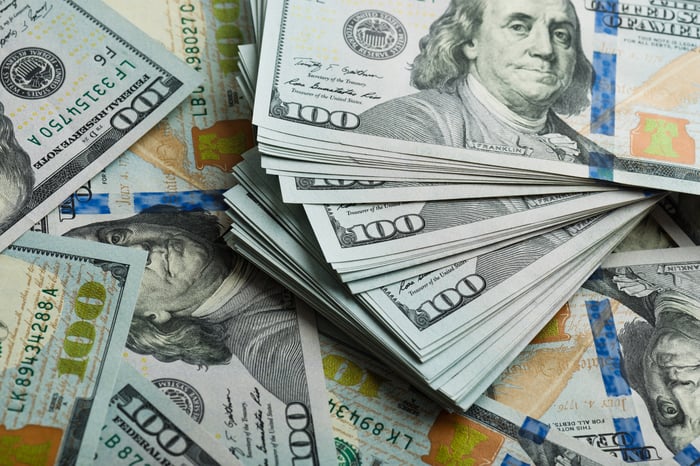You may already have ideas about how to spend your tax refund, but going on vacation or buying that new toy probably isn't the best use of that money. Being practical with your tax refund may not sound as fun, but it's almost always the better choice in the long run. Here's a look at some of the smartest places to put your tax refund.
1. Create or add to an emergency fund
Everyone should have an emergency fund that can cover three to six months of living expenses. This way, if you lose a job, become seriously ill, or have to replace a broken appliance, you can draw upon this money rather than take on debt. Use your tax refund to start your emergency fund if you don't have one or to pad your savings a little more. First, decide how many months of living expenses you want the emergency fund to cover. Then, total up your monthly living expenses and multiply them by this amount to determine how much you need to save.

Image source: Getty Images.
2. Repay debt
By paying off loans early, you reduce the interest you pay, which will save you money over the loan's lifetime. You could put your refund toward a car loan or mortgage to knock off a few payments, but if you have high-interest credit card debt, your money should go here first. These high interest rates, which can be over 25%, make it difficult to get out of debt and could cost you thousands of dollars, especially if you're only making the minimum payment.
A $1,000 credit card balance with a 25% APR will take nearly five years to pay off if you only make the minimum $30 payment, and you'll end up paying $740 in interest -- and that's assuming you aren't charging anything new to that card. Better to use your tax refund to end this vicious cycle if you can.
3. Save for retirement
You can contribute up to $19,000 to a 401(k) in 2019 or $6,000 to an IRA. Adults 50 and older may contribute up to $25,000 to a 401(k) and $7,000 to an IRA. You won't be able to access this money before age 59 ½ unless it's for a qualified reason, like a first home purchase. But if you don't need it before then, a retirement account is one of the best places for your tax refund.
First, contributions to a traditional IRA or 401(k) will reduce your taxable income, lowering your 2019 tax bill. But you will have to pay taxes on your distributions in retirement. If you contribute to a Roth 401(k) or IRA, you'll pay taxes on that money this year, but you won't pay any taxes on distributions as long as you're over 59 ½ and the money has been in your account for at least five years.
But the real benefit to putting your tax refund toward retirement is the compounding factor. That money will grow over time and the longer it sits in your account, the larger it will become. A single $2,500 tax refund invested today would be worth over $19,000 in 30 years, assuming a 7% annual rate of return. This is why it's so important to start saving for retirement early.
4. Invest
Consider investing your tax refund in a taxable brokerage account if you've already maxed out your retirement savings or if you want to be able to access your funds penalty-free before 59 ½. You'll have complete freedom to invest your money how you want, though you won't get the tax breaks you'd get with a retirement account.
You won't owe any money on your tax refund, but any subsequent money that you invest in that account is subject to tax. You'll also pay taxes on your capital gains. They're taxed at the standard income tax rates if you've held the assets for less than one year. If you've had them for longer than a year, they become subject to capital gains tax.
The amount you'll owe depends on your taxable income and tax filing status. You could pay no taxes on this amount or you could pay 15% or 20% of what you've earned. But no matter which capital gains tax bracket you fall into, you'll end up paying less than you would if you had to pay income tax on the same amount.
You don't have to use your entire tax refund in just one of these ways. You could split your money between two or more of these suggestions. But before you spend it on something else entirely, it's important that you understand the long-term implications of your decision. By spending that money today, you could be giving up the potential of an even larger sum in the future.






